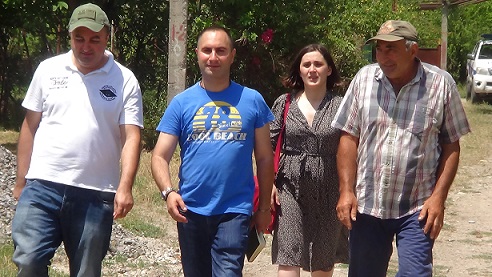Lado Bitchashvili, Shida Kartli
This year, only one child will go to public school from Zardiaantkari village in Gori municipality. The school is located in the neighboring Mereti village, which is 10 kilometers away from Zardiaantkari. There is neither school nor kindergarten in the village, which is located near the occupation line. However, it is the least issue for locals as they are more worried about the irrigation water, as it does not reach the agricultural plots of all families and people have their lands left without irrigation.
“My child will be the only first-year pupil in the public school from this village. People abandon the village because of inattention from the authority. There is no irrigation water. My land is far from the irrigation channel and we cannot get harvest from there,” Mzia Kareli said.
10 years after the war, the trace of the war is still seen in Zardiaantkari. Not much was done with the burnt and damaged houses. Rain is leaking through the war-damaged roof of Mzia Kareli’s house: “Windows are also damaged; we urge [the authority] to repair at least roof and window-frames, which were damaged during the war,” Mzia Kareli said.
The locals said the Harm Assessment Commission was first created in 2009 and then in 2014 but they never seen the conclusions of either commission as well as any aid from them.
“Initially, they created the commission during the governance of the UNM; they calculated the loss but there was no result. The second commission was created after the Georgian Dream came in office – the Ministry for Reconciliation and Equality created it but we did not receive any support from them either,” Tsisana Taziashvili said.
The residents of the ABL villages request to open outpatient’s office with a village doctor as most inhabitants are elderly people and they need doctor’s consultations every day. Alongside problems, the locals noted that motorway was reconstructed in the village and they were supplied with natural gas; they also get allowances in accordance to the Mountain Law.
Like in Zardiaantkari, the residents of the neighboring village of Gugutiantkari also have problems. Part of local population cannot use the irrigation channel, whose reconstruction cost up to 2 million GEL, as the water in the channel cannot reach the end. Locals complained about the drinking water too. The reservoir of the water boring-well, from where the village is supplied with water, has rust and water gets polluted.
Both villages belong to the Mereti community, whose representative in the local municipal assembly is Merab Makharashvili; he is aware of the problems. Makharashvili believes it is incredible that individual problems of locals, who suffered from the war, will be addressed from the local budget.
“I have already started working on the eradication of problems about drinking and irrigation water; as for the reimbursement of the damage from the war, there are not enough funds in the local budget,” Merab Makharashvili said.
HRC representatives arrived in the ABL villages to study the problems of locals. As the project manager Ucha Nanuashvili said the Center will prepare special report about the problems identified during the visits and will elaborate concrete recommendations to respective state institutions.
“Main purpose of these visits is to identify the problems of locals. Field visits help us to substantially study the situation and to address the identified problems. We made several field visits in the ABL villages, where we observed several problems regardless many programs which were launched in these villages.
We prepared first report about the compensation issue in Zardiaantkari, when I was Public Defender. The Public Defender’s Office requested solution of the problem but it has not been done yet and consequently there is high migration from these villages, which is caused by social-economic problems. It is necessary to open kindergartens, schools, medical centers in the villages alongside the occupation line and first of all, it is essential to ensure security. In some villages situation is better and there are police checkpoints there. However, there are villages, where people face real threats. Checkpoints shall be set up in these villages and law enforcement officers shall carry out effective patrolling in the area,” Ucha Nanuashvili said.
Humanrights.ge asked Ucha Nanuashvili about the initiative of the Minister of Interior Giorgi Gakharia, who plans to increase number of mobile groups alongside the occupation line.
“It is necessary to increase number of law enforcement officers and mobile groups but in the villages, where there is no police checkpoint, they should be opened. These villages are: Jariasheni, Bershueti and other settlements, where law enforcement officers should not only patrol but have permanent presence. We also evaluate dynamics of citizens’ kidnapping in the conflict-affected area and the HRC will prepare a report to have comprehensive information about the problem as according to our information not all facts are documented and statistic information disseminated by the Georgian and Russian sides contradicts each other,” HRC representative Ucha Nanuashvili said.
News
December 13, 2023
Ethnic minorities outside the peace dialogue
November 6, 2023
‘Peace’ agenda of political parties
Popular
Articles
February 13, 2024




